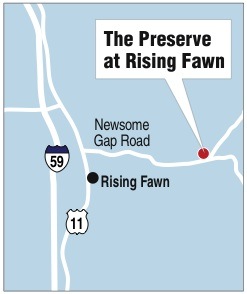Email nearly derails North Georgia land fraud trial
Friday, January 1, 1904
An email between an attorney and his client, sent by mistake to prosecutors as part of preparations for an April 8 federal fraud trial, nearly scrapped the entire investigation Monday.
Defense attorney John McDougal said he didn't know how the email, a privileged four-page document, got into a batch of files he sent to prosecutors as part of evidence exchange for his client Paul Gott III.
Gott, 40, of Jasper, Tenn., has been charged along with Joshua Dobson, of Kimball, Tenn., in a $45 million fraud and money laundering scheme involving an estimated 60 investors in five states. The investors paid for lots at the Preserve at Rising Fawn, Ga., a tract of more than 2,000 acres.
Prosecutor Perry Piper said his co-counsel John Macoon spotted the email, which contained potentially incriminating information, while reading through others that McDougal had sent.
The message, which since has been sealed, was communication between Gott and McDougal, protected in most instances by what's called "attorney-client privilege."
McDougal asked U.S. District Judge Curtis Collier that prosecutors not be allowed to use information in the document to cross-examine his client should Gott take the stand in the upcoming trial.
Collier reviewed what harm or potential appeal problem could come from the mistakenly shared information and asked Gott a series of questions.
Gott called the email a "blueprint" that prosecutors could use to plan their witness questions.
"You'd like to kick off the prosecution team?" Collier asked Gott.
"Yes, sir," Gott replied.
But Piper argued to Collier that there wasn't any need to replace the prosecution team and if what's in the email is true and Gott will agree that it is, then he'd be happy to sit back and await his turn at cross-examination.
Collier ultimately ruled that the email could not be used by the prosecution, but he said removing the attorneys and starting the case anew would be a "radical remedy" only appropriate in the most "drastic of circumstances."
Prosecutors allege the men had investors agree to use their personal credit as guarantees for the parcels while Gott and Dobson would pay the monthly payments until lots sold.
But the pair didn't pay, and investors were stuck with the mortgage bill. Some allowed properties to go into foreclosure because they couldn't afford the payments.
The last hearing before the scheduled April trial is set for Thursday.

